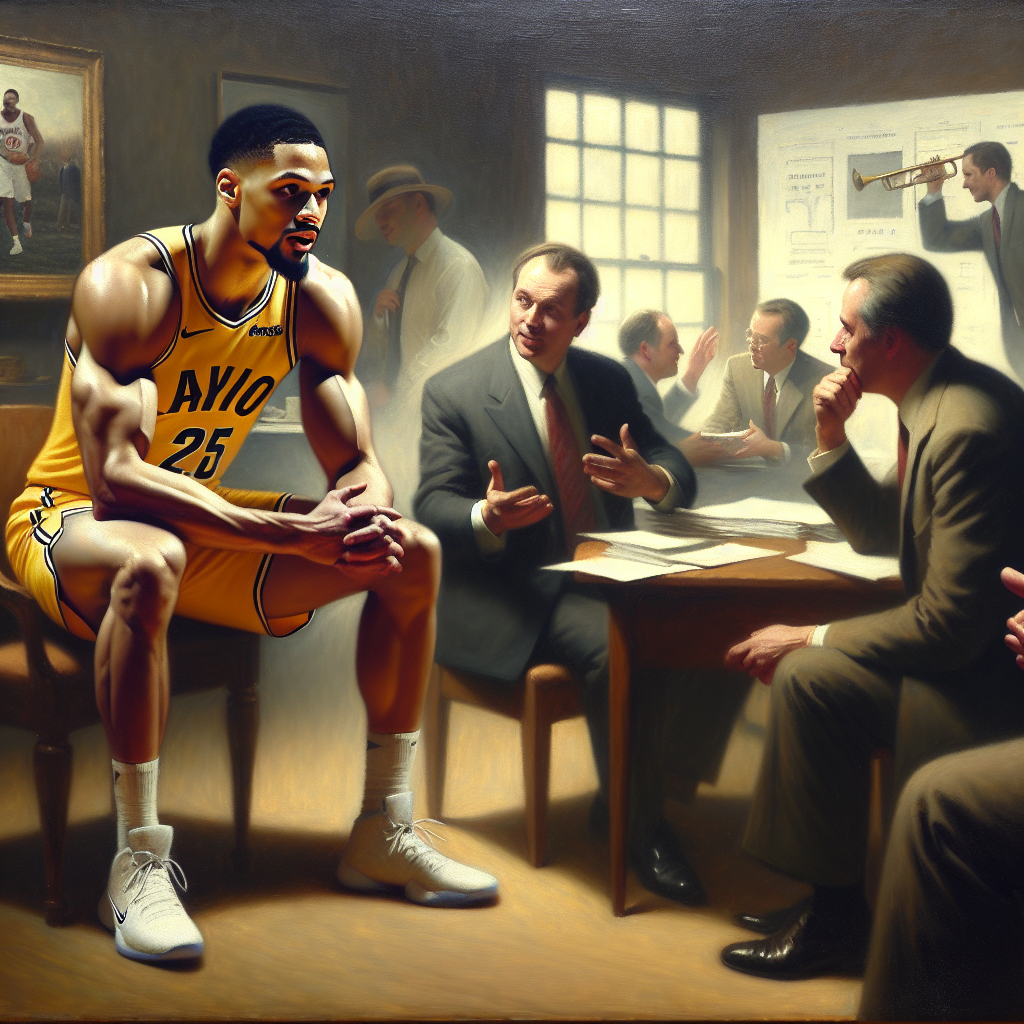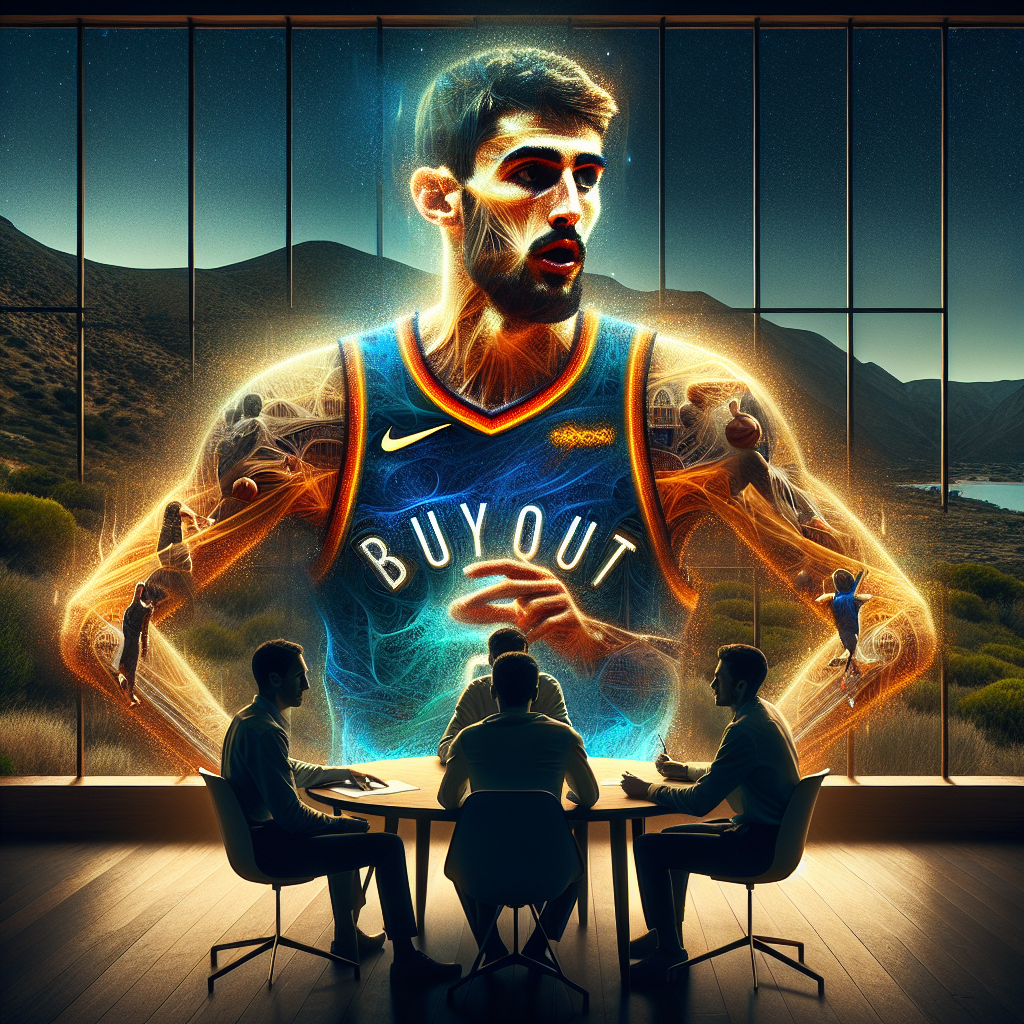Ricky Rubio and Cavaliers begin discussions on potential buyout

Ricky Rubio’s Future: What a Buyout Means for the Cavaliers
Ricky Rubio and the Cleveland Cavaliers have initiated discussions regarding a potential buyout, a move that could significantly impact both the player and the team. As these talks progress, it is essential to understand the implications of such a decision and what it means for the future of the Cavaliers.
Ricky Rubio, a seasoned point guard with a wealth of experience, has been a valuable asset to the Cavaliers since joining the team. His playmaking abilities, court vision, and leadership have contributed to the team’s overall performance. However, as the Cavaliers look to reshape their roster and build for the future, a buyout could provide both parties with an opportunity to pursue their respective goals.
A buyout, in essence, is an agreement between the player and the team to terminate the existing contract, allowing the player to become a free agent. This process often involves the player accepting a reduced amount of the remaining salary in exchange for the freedom to sign with another team. For the Cavaliers, a buyout with Rubio could free up salary cap space, enabling them to make strategic moves in the upcoming free agency period or trade market.
From Rubio’s perspective, a buyout could offer a fresh start and the chance to join a team that aligns more closely with his career aspirations. At this stage in his career, Rubio may seek a team with championship potential or one that can offer a more prominent role. By becoming a free agent, he would have the flexibility to explore various options and find the best fit for his skills and ambitions.
The potential buyout also raises questions about the Cavaliers’ future direction. With a young and promising core, including players like Darius Garland and Evan Mobley, the team is clearly focused on long-term development. By parting ways with Rubio, the Cavaliers could prioritize giving more playing time to their younger guards, allowing them to gain valuable experience and grow into their roles.
Moreover, the financial flexibility gained from a buyout could be instrumental in the Cavaliers’ efforts to attract key free agents or facilitate trades that bolster their roster. In the highly competitive landscape of the NBA, having the ability to maneuver financially can be a significant advantage. It allows the team to be more agile in responding to opportunities that arise, whether it be acquiring a star player or adding depth to the bench.
While the discussions between Rubio and the Cavaliers are ongoing, it is clear that both parties are considering their options carefully. For Rubio, the decision will likely hinge on finding a situation that aligns with his personal and professional goals. For the Cavaliers, the focus will be on making strategic moves that support their long-term vision and enhance their competitiveness.
In conclusion, the potential buyout of Ricky Rubio by the Cleveland Cavaliers is a multifaceted decision with far-reaching implications. It represents an opportunity for Rubio to seek a new chapter in his career while providing the Cavaliers with the flexibility to continue building their team for the future. As the discussions progress, the outcome will undoubtedly shape the trajectory of both the player and the franchise, highlighting the ever-evolving nature of the NBA landscape.
Potential Destinations for Ricky Rubio Post-Buyout

As the Cleveland Cavaliers and Ricky Rubio engage in discussions regarding a potential buyout, the basketball community is abuzz with speculation about where the seasoned point guard might land next. Rubio, known for his exceptional court vision and playmaking abilities, has been a valuable asset to every team he has played for. Consequently, several franchises are likely to express interest in acquiring his services should the buyout materialize.
One potential destination for Rubio is the Los Angeles Lakers. The Lakers have been in search of a reliable playmaker to complement their star-studded roster, which includes LeBron James and Anthony Davis. Rubio’s ability to facilitate the offense and create scoring opportunities for his teammates would be a significant addition to the Lakers’ backcourt. Moreover, his defensive prowess and experience could provide the stability and leadership the team needs to make a deep playoff run.
Another team that could benefit from Rubio’s talents is the Dallas Mavericks. The Mavericks have been heavily reliant on Luka Dončić to orchestrate their offense. Adding Rubio to the mix would not only alleviate some of the playmaking burden on Dončić but also enhance the team’s overall ball movement. Rubio’s presence could help unlock the full potential of the Mavericks’ offense, making them a more formidable opponent in the highly competitive Western Conference.
The Miami Heat also emerge as a plausible landing spot for Rubio. Known for their gritty defense and team-oriented play, the Heat could utilize Rubio’s skills to bolster their backcourt depth. His ability to run the offense efficiently and set up shooters like Duncan Robinson and Tyler Herro would be invaluable. Additionally, Rubio’s experience and basketball IQ align well with the Heat’s culture, making him a seamless fit within their system.
In the Eastern Conference, the Boston Celtics present another intriguing option. The Celtics have been in need of a true playmaking point guard to complement their dynamic duo of Jayson Tatum and Jaylen Brown. Rubio’s arrival could provide the Celtics with the floor general they have been seeking, allowing Tatum and Brown to focus more on scoring. His defensive capabilities would also enhance the Celtics’ perimeter defense, making them a more well-rounded team.
Furthermore, the New York Knicks could be a potential suitor for Rubio. The Knicks have made significant strides in recent seasons, and adding a veteran point guard like Rubio could accelerate their progress. His ability to mentor younger players such as Immanuel Quickley and RJ Barrett would be beneficial for their development. Rubio’s experience in high-pressure situations could also prove invaluable as the Knicks aim to establish themselves as perennial playoff contenders.
Lastly, the Phoenix Suns, where Rubio previously played, might consider bringing him back. His familiarity with the team’s system and chemistry with key players like Devin Booker and Deandre Ayton could make for a smooth transition. Rubio’s return could provide the Suns with additional depth and playmaking, further solidifying their status as one of the top teams in the league.
In conclusion, Ricky Rubio’s potential buyout from the Cleveland Cavaliers opens up a myriad of possibilities for his next destination. Teams across the NBA are likely to vie for his services, given his unique skill set and wealth of experience. Whether he ends up with a championship contender or a rising team looking to make a playoff push, Rubio’s impact will undoubtedly be felt wherever he goes. As the situation unfolds, basketball fans and analysts alike will be keenly watching to see where this talented point guard lands next.
Impact of Ricky Rubio’s Buyout on the Cavaliers’ Roster and Strategy
The Cleveland Cavaliers and Ricky Rubio have initiated discussions regarding a potential buyout, a move that could significantly impact the team’s roster and strategic approach. As the Cavaliers navigate the complexities of the NBA season, the potential departure of Rubio introduces both challenges and opportunities for the organization.
Ricky Rubio, a seasoned point guard known for his playmaking abilities and veteran leadership, has been an integral part of the Cavaliers’ backcourt. His experience and court vision have provided stability and a sense of direction, particularly for the younger players on the roster. However, as the team evaluates its long-term goals and immediate needs, the possibility of a buyout suggests a shift in priorities.
One immediate consequence of a buyout would be the opening of a roster spot. This could allow the Cavaliers to explore other options, whether through free agency, trades, or promoting a player from within their developmental system. The flexibility gained from such a move could be pivotal as the team seeks to balance its mix of veteran presence and youthful potential. Moreover, the financial implications of a buyout could provide the Cavaliers with additional cap space, enabling them to make strategic acquisitions that align with their vision for the future.
Transitioning from Rubio’s influence on the court, the Cavaliers would need to address the void left in their playmaking department. Rubio’s ability to orchestrate the offense and facilitate ball movement has been a cornerstone of the team’s strategy. Without his presence, the responsibility would likely fall on other guards, such as Darius Garland and Collin Sexton, to step up and fill the leadership role. This shift could accelerate the development of these young players, pushing them to take on more significant roles and responsibilities.
Furthermore, the potential buyout could also impact the team’s defensive strategy. Rubio’s defensive acumen and ability to read the game have been assets in containing opposing guards and disrupting offensive plays. The Cavaliers would need to reassess their defensive schemes and possibly adjust their rotations to compensate for his absence. This could involve increased minutes for other perimeter defenders or a strategic shift to a more team-oriented defensive approach.
In addition to the on-court implications, Rubio’s departure could influence the team’s locker room dynamics. His veteran presence and mentorship have been invaluable in fostering a cohesive and motivated team environment. The Cavaliers would need to ensure that the leadership void is addressed, possibly by empowering other veterans or encouraging younger players to take on more prominent roles within the team culture.
As the discussions between Ricky Rubio and the Cavaliers progress, the organization must weigh the immediate benefits of a buyout against the long-term impact on the team’s development and competitive aspirations. The decision will undoubtedly shape the Cavaliers’ strategy moving forward, influencing their approach to roster construction, player development, and overall team dynamics.
In conclusion, the potential buyout of Ricky Rubio presents a multifaceted scenario for the Cleveland Cavaliers. While it offers opportunities for roster flexibility and financial maneuvering, it also necessitates careful consideration of the on-court and off-court ramifications. The Cavaliers’ ability to navigate this transition effectively will be crucial in maintaining their trajectory towards becoming a competitive force in the NBA.

